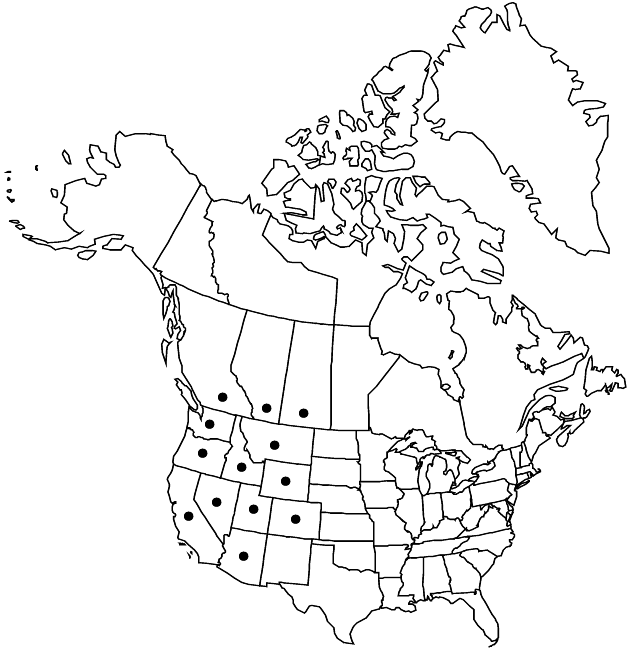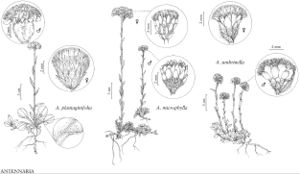Difference between revisions of "Antennaria umbrinella"
Bull. Torrey Bot. Club 24: 302. 1897.
FNA>Volume Importer |
FNA>Volume Importer |
||
| Line 12: | Line 12: | ||
|name=Antennaria aizoides | |name=Antennaria aizoides | ||
|authority=Greene | |authority=Greene | ||
| − | }}{{Treatment/ID/Synonym | + | }} {{Treatment/ID/Synonym |
|name=Antennaria flavescens | |name=Antennaria flavescens | ||
|authority=Rydberg | |authority=Rydberg | ||
| − | }}{{Treatment/ID/Synonym | + | }} {{Treatment/ID/Synonym |
|name=Antennaria reflexa | |name=Antennaria reflexa | ||
|authority=E. E. Nelson | |authority=E. E. Nelson | ||
| Line 33: | Line 33: | ||
|elevation=1100–3400 m | |elevation=1100–3400 m | ||
|distribution=Alta.;B.C.;Sask.;Ariz.;Calif.;Colo.;Idaho;Mont.;Nev.;Oreg.;Utah;Wash.;Wyo. | |distribution=Alta.;B.C.;Sask.;Ariz.;Calif.;Colo.;Idaho;Mont.;Nev.;Oreg.;Utah;Wash.;Wyo. | ||
| − | |discussion=<p>Antennaria umbrinella is a primary sexual progenitor of the A. rosea complex (R. J. Bayer 1990b). It is characterized by somewhat erect, slightly woody stolons and phyllaries that are usually various shades of brown, sometimes white, or streaked with pink or rose (Bayer 1987b).</p> | + | |discussion=<p><i>Antennaria umbrinella</i> is a primary sexual progenitor of the <i>A. rosea</i> complex (R. J. Bayer 1990b). It is characterized by somewhat erect, slightly woody stolons and phyllaries that are usually various shades of brown, sometimes white, or streaked with pink or rose (Bayer 1987b).</p> |
|tables= | |tables= | ||
|references= | |references= | ||
| Line 57: | Line 57: | ||
|publication year=1897 | |publication year=1897 | ||
|special status= | |special status= | ||
| − | |source xml=https://jpend@bitbucket.org/aafc-mbb/fna-data-curation.git/src/ | + | |source xml=https://jpend@bitbucket.org/aafc-mbb/fna-data-curation.git/src/8f726806613d60c220dc4493de13607dd3150896/coarse_grained_fna_xml/V19-20-21/V19_659.xml |
|tribe=Asteraceae tribe Gnaphalieae | |tribe=Asteraceae tribe Gnaphalieae | ||
|genus=Antennaria | |genus=Antennaria | ||
Revision as of 16:13, 18 September 2019
Dioecious. Plants 7–16 cm (bases somewhat woody). Stolons 7–16 cm (usually erect, slightly woody). Basal leaves 1-nerved, narrowly spatulate to cuneate, 10–17 × 2–5.4 mm, tips mucronate, faces gray-tomentose. Cauline leaves linear, 8–18 mm, not flagged (apices acute). Heads 3–8 in corymbiform arrays. Involucres: staminate 3–6 mm; pistillate 4–6.5 mm. Phyllaries distally whitish, yellowish, or pale brownish (often streaked with pink or rose). Corollas: staminate 2.5–3.5 mm; pistillate 2.5–3.5 mm. Cypselae 0.5–1.2 mm, glabrous; pappi: staminate 3–4.5 mm; pistillate 3–5 mm. 2n = 28, 56.
Phenology: Flowering summer.
Habitat: Sagebrush steppe to open, dry, coniferous montane forests to subalpine meadows
Elevation: 1100–3400 m
Distribution

Alta., B.C., Sask., Ariz., Calif., Colo., Idaho, Mont., Nev., Oreg., Utah, Wash., Wyo.
Discussion
Antennaria umbrinella is a primary sexual progenitor of the A. rosea complex (R. J. Bayer 1990b). It is characterized by somewhat erect, slightly woody stolons and phyllaries that are usually various shades of brown, sometimes white, or streaked with pink or rose (Bayer 1987b).
Selected References
None.
